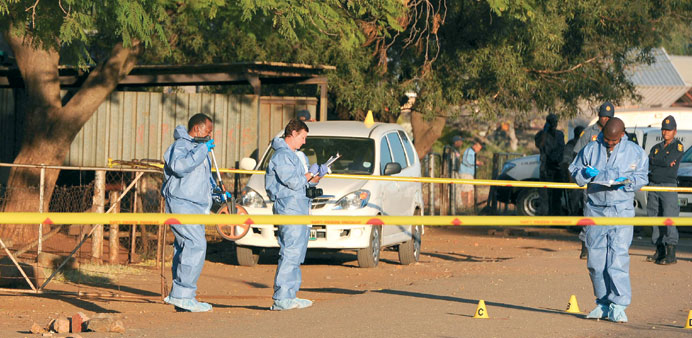South African crime scene experts work at the scene of the shooting in Marikana yesterday.
Reuters/Johannesburg
A shop steward from South Africa’s National Union of Mineworkers (NUM) was shot dead yesterday at a Lonmin mine, police and the union said, sparking fears of a renewed cycle of violence in the troubled platinum belt.
Lonmin said the shooting, in which another union official was also critically injured, took place at the NUM offices at Wonderkop community, which is near the town of Marikana, 120km northwest of Johannesburg, where police shot dead 34 miners last August, the country’s deadliest police action since the end of apartheid.
“Two people were shot,” regional police spokesman Sabata Mokgwabone said. “One died on the scene and another one was taken to hospital.”
Both men were Lonmin employees, the company said.
The rand retreated against the dollar after the shooting amid fears of further unrest in the mining sector. Lonmin’s Johannesburg-listed shares fell more than 6%, and the London-listed stock dropped 4%.
More than 50 people died last year in wildcat strikes and violence relating to a bloody turf war between NUM and the rival Association of Mineworkers and Construction Union (AMCU), which has poached tens of thousands of disgruntled NUM workers.
Neither NUM nor the police could say who was responsible for the attack.
In the past both unions have accused each other of attacking and killing their members.
Last month Lonmin suffered a wildcat walkout at Marikana after a gunman shot dead an AMCU union official in a bar.
Tensions in South Africa’s mining sector remain high, with union battles far from settled and workers opposing a plan by Anglo American Platinum to cut 6,000 jobs.
Tough wage talks are also in prospect in the gold mines, with the NUM demanding pay increases of up to 60% at a time when companies are struggling with shrinking margins and falling commodity prices.
The wildcat strikes that started at Marikana last year have also spread beyond platinum and gold.
Glencore Xstrata Plc said yesterday it had sacked 1,000 workers across three of its chrome mines for an illegal strike last week that brought those operations to a standstill.
With South Africa’s economic growth this year forecast at less than 3%, the government has repeatedly urged unions and employers to avoid turmoil in mid-year wage rounds, known as “strike season”, and to settle union disputes peacefully.
The unrest and its impact on a limping economy could damage the ruling African National Congress in an election due early next year, though there is little chance it will lose its outright majority in parliament.
The rand lost 13% against the dollar in May amid fears of a knock to growth and breached the psychological level of 10 to the greenback after a failed attempt by President Jacob Zuma to allay concerns over labour unrest.



